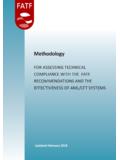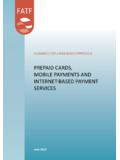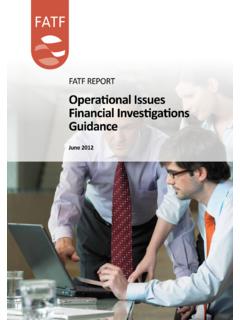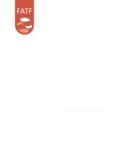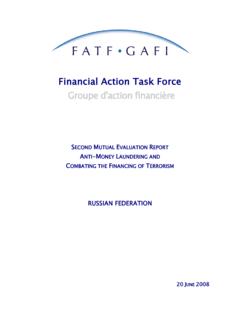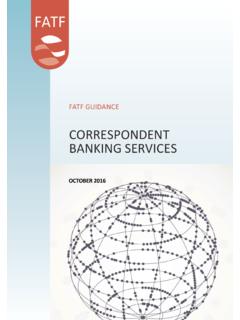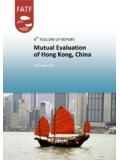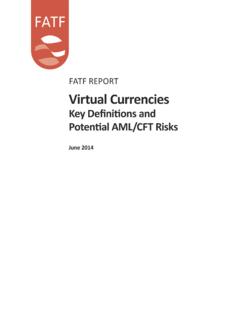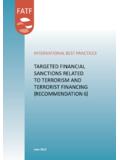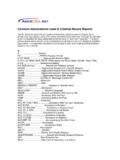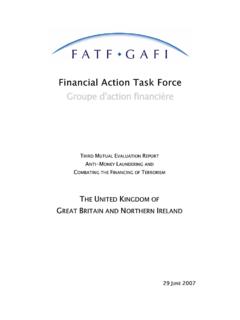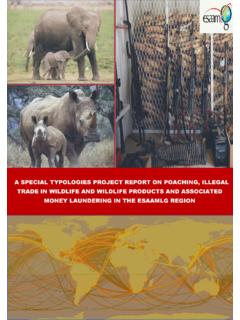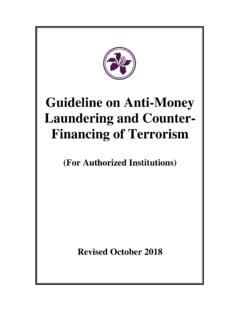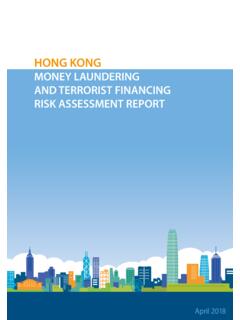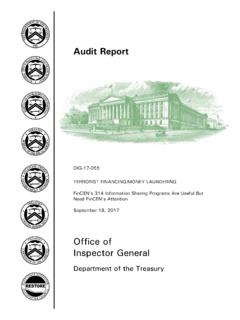Transcription of Mutual Evaluation Report - FATF-GAFI.ORG
1 ASIA/PACIFIC GROUP ON MONEY LAUNDERING FINANCIAL ACTION TASK FORCE Mutual Evaluation Report Anti-Money Laundering and Combating the Financing of Terrorism korea 26 June 2009 2 korea is a member of the Asia/Pacific Group on Money Laundering (APG) and an observer member of the Financial Action Task Force (FATF). This Evaluation was conducted by the FATF and the APG and was adopted as a 3rd Mutual Evaluation by the FATF Plenary on 26 June 2009 and endorsed by the APG during its annual meeting on 10 July 2009. 2009 FATF/OECD and APG. All rights reserved. No reproduction or translation of this publication may be made without prior written permission. Requests for permission to further disseminate, reproduce or translate all or part of this publication should be obtained from the FATF Secretariat, 2 rue Andr Pascal, 75775 Paris Cedex 16, France (fax: +33 4 44 30 61 37 or e-mail 3 TABLE OF CONTENTS PREFACE.)
2 5 EXECUTIVE SUMMARY .. 6 1. GENERAL .. 14 General Information on korea .. 14 General Situation of Money Laundering and Financing of Terrorism .. 16 Overview of the Financial Sector and DNFBPs .. 19 Overview of Commercial Laws and Mechanisms Governing Legal Persons and Arrangements .. 25 Overview of Strategy to Prevent Money Laundering and Terrorist Financing .. 25 2. LEGAL SYSTEM AND RELATED INSTITUTIONAL MEASURES .. 32 Criminalisation of Money Laundering ( & ) .. 32 Criminalisation of Terrorist Financing ( ) .. 41 Confiscation, Freezing and Seizing of Proceeds of Crime ( ) .. 44 Freezing of Funds used for Terrorist Financing ( ) .. 49 The Financial Intelligence Unit and its Functions ( ) .. 55 Law Enforcement, Prosecution and Other Competent Authorities the Framework for Investigation and Prosecution of Offences and for Confiscation and Freezing ( & 28).
3 65 Cross-border Declaration or Disclosure ( ) .. 74 3. PREVENTIVE MEASURES: FINANCIAL INSTITUTIONS .. 82 Risk of Money Laundering or Terrorist Financing .. 89 Customer Due Diligence, Including Enhanced or Reduced Measures ( to 8) .. 89 Third parties and Introduced Business ( ) .. 107 Financial Institution Secrecy or Confidentiality ( ) .. 110 Record keeping and Wire Transfer Rules ( & ) .. 111 Monitoring of Transactions and Relationships ( & 21) .. 115 Suspicious Transaction Reports and Other Reporting ( , 19, 25 & ) .. 118 Internal Controls, Compliance, Audit and Foreign Branches ( & 22) .. 126 Shell Banks ( ) .. 131 The Supervisory and Oversight System: Competent Authorities and SROs. Role, Functions, Duties and Powers (Including Sanctions) ( , 29, 17 & 25) .. 135 Money or Value Transfer Services ( ) .. 156 4. PREVENTIVE MEASURES DESIGNATED NON-FINANCIAL BUSINESSES AND PROFESSIONS.
4 158 Customer Due Diligence and Record-keeping ( , applying , 6, and 8 to 11) .. 158 Monitoring Transactions and Other Issues ( , applying , 17 & 21) .. 160 Regulation, Supervision and Monitoring ( , ) .. 162 Other Non-financial Businesses and Professions Modern Secure Transaction Techniques ( ) .. 164 45. LEGAL PERSONS AND ARRANGEMENTS & NON-PROFIT ORGANISATIONS .. 166 Legal Persons Access to Beneficial Ownership and Control Information ( ) .. 166 Legal Arrangements Access to Beneficial Ownership and Control Information ( ) .. 170 Non-profit Organisations ( ) .. 172 6. NATIONAL AND INTERNATIONAL CO-OPERATION .. 179 National Co-operation and Co-ordination ( and ) .. 179 The Conventions and UN Special Resolutions ( & ) .. 183 Mutual Legal Assistance ( , ) .. 184 Extradition ( , 39, ) .. 191 Other Forms of International Co-operation ( & ).
5 194 7. OTHER ISSUES .. 204 Resources and Statistics ( & ) .. 204 Other Relevant AML/CFT Measures or Issues .. 204 General Framework for AML/CFT System (see also ) .. 204 TABLES .. 205 Table 1. Ratings of Compliance with FATF Recommendations .. 205 Table 2. Recommended Action Plan to Improve the AML/CFT System .. 214 Table 3: Authorities Response to the Evaluation .. 223 ANNEXES .. 224 ANNEX 1: Abbreviations .. 225 ANNEX 2: All Bodies Met During the On-site Visit .. 227 ANNEX 3: Provisions of Key Laws, Regulations and Other Measures .. 228 ANNEX 4: All Laws, Regulations and Other Material Received .. 258 5 PREFACE Information and methodology used for the Evaluation of the Republic of korea 1. The Evaluation of the anti-money laundering (AML) and combating the financing of terrorism (CFT) regime of the Republic of korea (hereinafter korea ) was based on the Forty Recommendations 2003 and the Nine Special Recommendations on Terrorist Financing 2001 of the Financial Action Task Force (FATF), and was prepared using the Methodology for Assessing Compliance with the FATF 40 Recommendations and the FATF 9 Special Recommendations, 27 February 2004 (updated as of October 2008).
6 As korea is an FATF observer and a member of the Asia/Pacific Group on Money Laundering (APG), this Evaluation was conducted jointly by both bodies. The Evaluation was based on the laws, regulations and other materials supplied by korea , and information obtained by the Evaluation team during its on-site visit to korea from 3 to 15 November 2008 inclusive, and subsequently. During the on-site visit the Evaluation team met with officials and representatives of all relevant Korean government agencies and the private sector. A list of the bodies met is set out in Annex 2 to this Mutual Evaluation Report . 2. The Evaluation was conducted by a team comprised of experts in criminal law, law enforcement and regulatory issues as well as members of the FATF Secretariat and the APG Secretariat: Mr. Hiroyuki Kondo, Japan Financial Intelligence Centre, Japan, law enforcement expert; Mr.
7 Gavin Shiu, Department of Justice, Hong Kong, China, legal expert; Mr. Jorge Fern ndez Ord s, Ministry of Economy and Finance, Spain, financial expert; Ms. Deborah Man Seong Ng, Financial Intelligence Office, Macao, China, financial expert; Ms. Anne Shere Wallwork, Department of the Treasury, United States, financial expert; Ms. Rachelle Boyle of the FATF Secretariat; and, Dr Gordon Hook of the APG Secretariat. The Evaluation team reviewed the institutional framework, the relevant AML/CFT laws, regulations, guidelines and other requirements, and the regulatory and other systems in place to deter money laundering (ML) and terrorist financing (TF) through financial institutions and designated non-financial businesses and professions (DNFBPs), and examined the capacity, implementation and effectiveness of all these systems. 3. This Report provides a summary of the AML/CFT measures in place in korea as at the date of the on-site visit or immediately thereafter.
8 It describes and analyses those measures, sets out korea s levels of compliance with the FATF 40+9 Recommendations (see Table 1), and provides recommendations on how certain aspects of the system could be strengthened (see Table 2). 6 EXECUTIVE SUMMARY 1. Key Findings 1. The key findings of this Evaluation are: korea has demonstrated political commitment, and commitment by government agencies and the private sector, to anti-money laundering (AML) efforts since the mid 1990s. It has participated actively within the Asia/Pacific Group on Money Laundering and the Egmont Group of Financial Intelligence Units. korea s counter-terrorist financing (CFT) system is new, coming into effect in December 2008, and it could be further strengthened. korea does not have structured organised crime syndicates, but rather has brotherhoods which are primarily involved in online gambling, loan-sharking, extortion and prostitution.
9 The most prevalent offences in korea are fraud; theft; forgery; and, copyright and trademark violations. The most common money laundering (ML) techniques involve cash transactions and accounts in other persons names. Given the prevalence of cash transactions in ML activities, in 2006 the government implemented a cash transaction reporting system. There have been no confirmed cases of terrorist financing (TF) in korea to date. However, authorities recognise that korea might be attractive to persons wishing to move funds or goods through korea in order to make them appear legitimate. The ML offences are largely in line with international requirements but penalties available and applied are not sufficiently effective, proportionate or dissuasive and there is a lack of focus on ML investigations. The confiscation regime is sound and it applies to all crimes but, given the size of the economy and the risk of money being laundered in korea , the number of confiscations each year and the value confiscated is low.
10 The korea Financial Intelligence Unit (KoFIU), is korea s financial intelligence unit (FIU) and the lead agency in korea for AML/CFT matters. The Korean AML/CFT system is heavily reliant on KoFIU s work on financial intelligence, AML/CFT supervision, training of obliged entities, policy, reform, national co-ordination and international co-operation. Customer identification and verification represents a strength in the Korean preventive measures but issues such as beneficial ownership, politically exposed persons and correspondent banking have yet to be addressed. In addition, the obligation to file suspicious transaction reports (STRs) only applies to transactions over KRW 20 million (USD 17 227). The level of sanctions available for breaches of AML/CFT obligations is low and sanctions are not often applied by supervisory authorities. However the compliance culture within Korean financial institutions is very strong.

